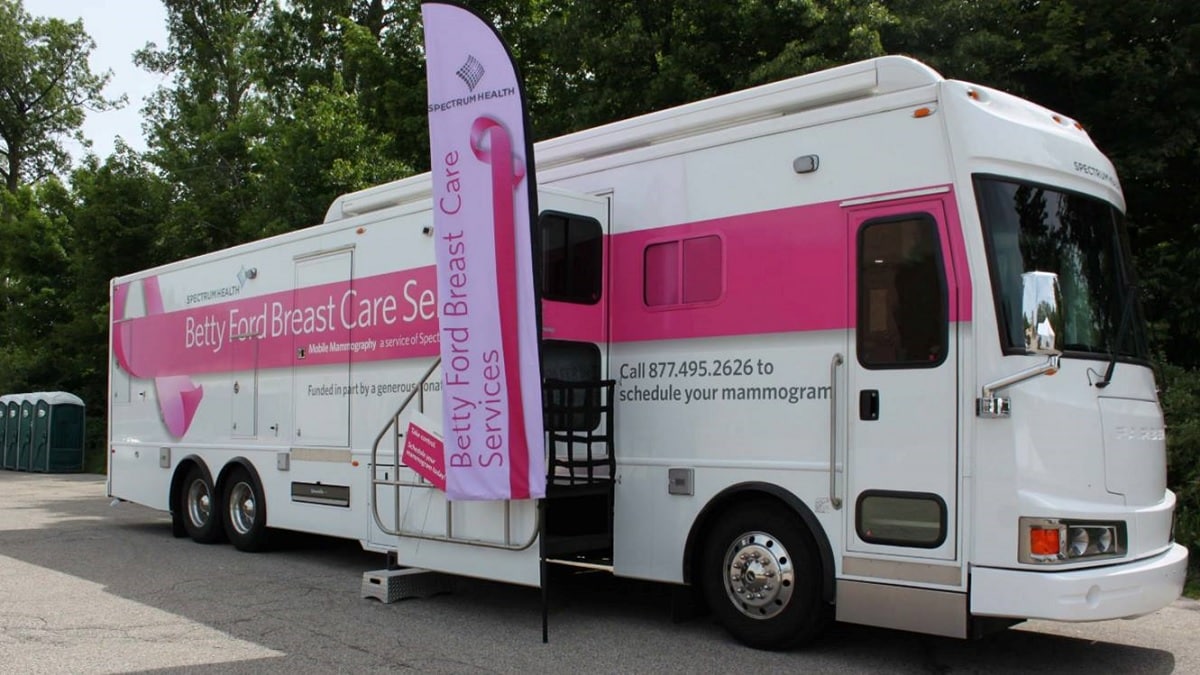What to know
Overview

Award recipients in CDC's National Breast and Cervical Cancer Early Detection Program have found many innovative ways to help those in need of cancer screening get the tests they need. Below, we share highlights from some programs that provided cancer screening services on weekends, at health fairs, and on a mammogram van.
Mammogram van helps American Indian women get screened in Michigan
American Indian women who live in rural parts of Michigan's Upper Peninsula may have trouble getting mammograms because tribal clinics are not located near hospitals or mammography facilities. To help these women, staff from the tribal clinics, tribal council, and the local health department hosted a mammogram van in different places over several days in May 2019. The Michigan Breast and Cervical Cancer Control Navigation Program coordinated the event.
As a result, 99 women were screened for breast cancer, 74 of whom were clients of the two Tribal health clinics; the rest were casino employees and county residents. Some said they had not had a mammogram in 10 years. Two women were referred for more tests at a mammography facility, but neither had cancer. Six uninsured women were enrolled in the Michigan Breast and Cervical Cancer Control Navigation Program.
Utah program reaches women through health fairs
The Utah Cancer Control Program had little success educating, enrolling, or screening the desired number of women at health fairs, so they stopped participating in these events. But Intermountain Healthcare, a large health system, asked for help getting women who are medically underserved screened for breast and cervical cancer at the Junior League Community Assistance and Resource Event in July 2019.
The Utah Cancer Control Program worked with physician assistant students from the University of Utah to provide clinical breast exams and Pap tests at the event. Providing these services on-site resulted in 148 women being enrolled in the program over two days. Many women were screened who had never been screened before.
Forming relationships like this at the community level has allowed the program to continue to reach groups of people who need help the most. For example, in the fall of 2019, the program partnered with a mobile mammogram unit to provide mammograms at the Urban Indian Walk In Center. As a result, 17 women were screened in three hours. Most had never had a mammogram before, including two women in their 60s.
Saturday appointments help hundreds of women in Guam
Many people in Guam have trouble going to doctor's appointments on weekdays. Some can't take time off from work and others are caring for family members at home who cannot be left alone. They also lack transportation to get to the clinic. To address these barriers, the Guam Breast and Cervical Cancer Early Detection Program contracted with the FHP Health Center to provide clinic services on at least one Saturday every month.
The FHP Health Center was open on eight Saturdays during October 2018 through June 2019. The new weekend hours allowed 308 more women to be served, resulting in 100 mammograms, 173 Pap tests, and 163 human papillomavirus (HPV) tests. Offering Saturday clinics increased access to cancer screening. About two-thirds of Guam's Breast and Cervical Cancer Early Detection Program patients were screened at a Saturday clinic rather than a weekday clinic.
Weekend event allows women in Alaska to get needed screening tests
In the North Slope Borough of Alaska, American Indian and Alaska Native women had trouble getting time off work to go to cancer screening appointments during regular business hours. So, the Arctic Slope Screening for Life Program started a weekend event called Girls' Night Out that let women get screened on their day off. Program staff made a list of women who needed to be screened and mailed them a flyer for the event. They also put up advertisements in town and the program director advertised it on the local radio station. Hospital staff also invited women. The event, which became annual, offered refreshments and activities including a bean bag toss, photo booth with props, and breast cancer quizzes.
During the October 2018 Girls' Night Out event, 69 women got mammograms and 12 women got Pap tests. Many of these women were past due to be screened for cancer or had never been screened before. One patient was 46 years old and had not received a Pap test in more than 20 years.
